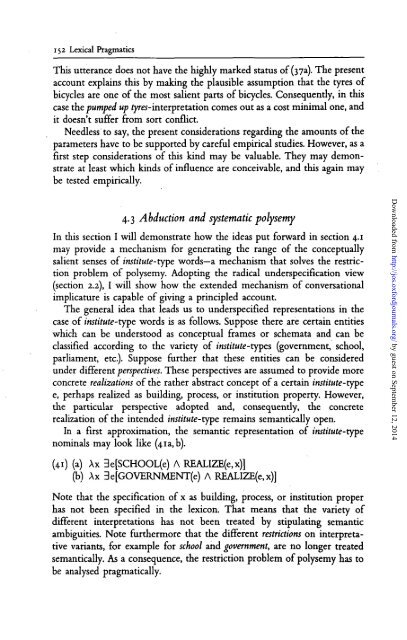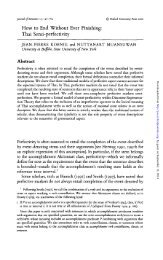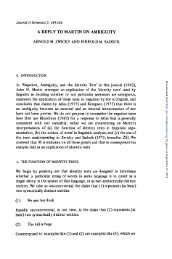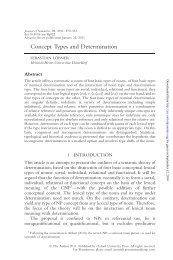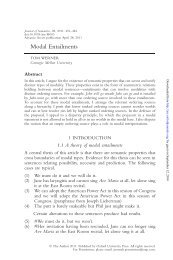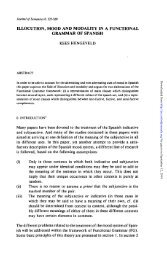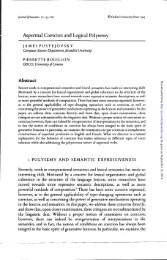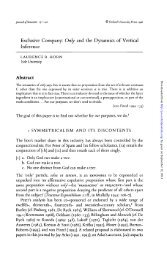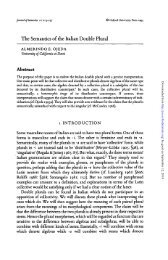Lexical Pragmatics - Journal of Semantics
Lexical Pragmatics - Journal of Semantics
Lexical Pragmatics - Journal of Semantics
You also want an ePaper? Increase the reach of your titles
YUMPU automatically turns print PDFs into web optimized ePapers that Google loves.
152 <strong>Lexical</strong> <strong>Pragmatics</strong>This utterance does not have the highly marked status <strong>of</strong> (37a). The presentaccount explains this by making the plausible assumption that the tyres <strong>of</strong>bicycles are one <strong>of</strong> the most salient parts <strong>of</strong> bicycles. Consequently, in thiscase the pumped up tyres- interpretation comes out as a cost minimal one, andit doesn't suffer from sort conflict.Needless to say, the present considerations regarding the amounts <strong>of</strong> theparameters have to be supported by careful empirical studies. However, as afirst step considerations <strong>of</strong> this kind may be valuable. They may demonstrateat least which kinds <strong>of</strong> influence are conceivable, and this again maybe tested empirically.4.3 Abduction and systematic polysemyIn this section I will demonstrate how the ideas put forward in section 4.1may provide a mechanism for generating the range <strong>of</strong> the conceptuallysalient senses <strong>of</strong> institute-type words—a mechanism that solves the restrictionproblem <strong>of</strong> polysemy. Adopting the radical underspecification view(section 2.2), I will show how the extended mechanism <strong>of</strong> conversationalimplicature is capable <strong>of</strong> giving a principled account.The general idea that leads us to underspecified representations in thecase <strong>of</strong> institute-type words is as follows. Suppose there are certain entitieswhich can be understood as conceptual frames or schemata and can beclassified according to the variety <strong>of</strong> institute-types (government, school,parliament, etc.). Suppose further that these entities can be consideredunder different perspectives. These perspectives are assumed to provide moreconcrete realizations <strong>of</strong> the rather abstract concept <strong>of</strong> a certain institute-typee, perhaps realized as building, process, or institution property. However,the particular perspective adopted and, consequently, the concreterealization <strong>of</strong> the intended institute-type remains semantically open.In a first approximation, the semantic representation <strong>of</strong> institute-typenominals may look like (41a, b).Downloaded from http://jos.oxfordjournals.org/ by guest on September 12, 2014(41) (a) Ax 3e[SCHOOL(e) A REALIZE(e, x)](b) Ax 3e[GOVERNMENT(e) A REALIZE(e, x)]Note that the specification <strong>of</strong> x as building, process, or institution properhas not been specified in the lexicon. That means that the variety <strong>of</strong>different interpretations has not been treated by stipulating semanticambiguities. Note furthermore that the different restrictions on interpretativevariants, for example for school and government, are no longer treatedsemantically. As a consequence, the restriction problem <strong>of</strong> polysemy has tobe analysed pragmatically.


